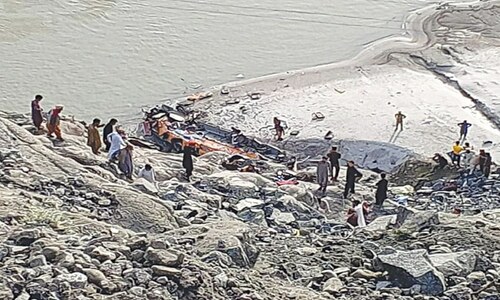ISLAMABAD, Dec 12: Pakistan will not hand over any Pakistani wanted in the Mumbai attacks to India, it was announced after a meeting between President Asif Ali Zardari and Prime Minister Yousuf Raza Gilani on Friday. The decision is likely to aggravate tension between the two countries.
The meeting focussed on the current situation against the backdrop of the terrorist attacks in India last month, the sources said. Minister for Information and Broadcasting Sherry Rehman attended the meeting.
Sources said the two leaders decided that the government would take action against any Pakistani individual found to have been involved in the Mumbai attacks.
New Delhi had urged Islamabad to hand over people belonging to the outlawed Lashkar-i-Taiba and Jamaatud Dawa, recently banned under a United Nations resolution.
Earlier, Adviser to the Prime Minister on Interior Rehman Malik said that India had demanded extradition of two Indian nationals — Dawood Ibrahim and Tiger Memon — and Maulana Masood Azhar, a Pakistani.
However, Indian Foreign Minister Pranab Mukharjee said his country had provided a list of 40 people suspected of being involved in the Mumbai killings.
Observers believe that the standoff between the two countries might intensify after Islamabad’s categorical refusal to hand-over its citizens to India.
Pakistan maintains it is trying to establish possible links of certain individuals with the Mumbai attacks, but India has not yet provided any evidence.
Mudassir Raja adds from Rawalpindi: Defence Minister Chaudhry Ahmed Mukhtar said on Friday that Pakistan had launched a crackdown on Jamaatud Dawa to avoid being declared a ‘terrorist state’ by the United Nations.
“Had the action not been taken, the UN would have declared Pakistan as a ‘terrorist state’ and imposed economic sanctions,” he told reporters at the Benazir Bhutto International Airport after welcoming the first batch of Hajis who returned home on Friday. “We were left with no option but to take action against Jamaatud Dawa.”
Mr Mukhtar said the armed forces were capable of defending the sovereignty of the country. He said Pakistan was a peaceful country and wanted peace in the region, but this desire should not be taken as weakness.
He said President Asif Ali Zardari, during a meeting with him earlier in the day, had stressed the need for taking effective measures to stop and counter allegations of terrorism against Pakistan.
The minister said that war had never been a solution to any problem.
“The real policy or strategy should be to create an atmosphere conducive to de-escalation of tension for peace and security of the region. We have still been experiencing bad effects of 1965, 1971 and Afghan wars,” he said, adding that after the 9/11 incident, Pakistan had been passing through a critical juncture and had been a victim of terrorism.
Mr Mukhtar said the war against terror would continue.














































Dear visitor, the comments section is undergoing an overhaul and will return soon.